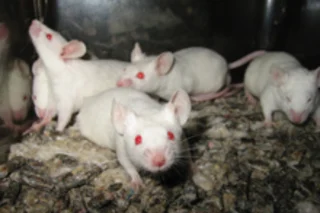It feels good to win. And it feels even better to win at home.
For a new study in the Proceedings of the National Academy of Sciences, Matthew Fuxjager and his colleagues investigated the winner effect, wherein animals (and perhaps humans) build up testosterone in advance of a confrontation, and the fight's winner maintains that elevated level. By studying male mice fighting one another, Fuxjager was able to see what happens in the brains of winners. Not only did victorious mice experience the "winner effect," but those who won at home—in their own cages—saw the most activity, and wanted to keep on fighting.
To get these results, Fuxjager's team essentially created a tournament of mouse fights.
One challenge they faced was ensuring the right mice won the right fights. They got around this by borrowing a trick from seedy boxing promoters the world over, pairing the favored mouse with a ...














